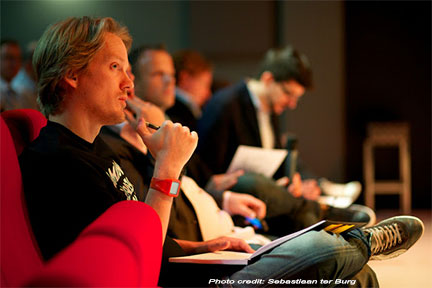 When Simon Sinek (noted author, speaker, and expert on leadership) was asked about leading Millennials in the workplace on Inside Quest, his response went viral. With millions of views and social media shares, he clearly struck a chord with the workforce. He noted 4 characteristics about Millennials that present a challenge in the workplace: parenting, technology, impatience, and environment. Simon explains that through no fault of their own, Millennials are significantly affected by failed parenting strategies where parents forced recognition/awards on all kids whether their performance merited it or not. They also grew up being told they can have anything they want, whether they deserve it or not.
When Simon Sinek (noted author, speaker, and expert on leadership) was asked about leading Millennials in the workplace on Inside Quest, his response went viral. With millions of views and social media shares, he clearly struck a chord with the workforce. He noted 4 characteristics about Millennials that present a challenge in the workplace: parenting, technology, impatience, and environment. Simon explains that through no fault of their own, Millennials are significantly affected by failed parenting strategies where parents forced recognition/awards on all kids whether their performance merited it or not. They also grew up being told they can have anything they want, whether they deserve it or not.
Simon then explains that technology amplifies the problem because it helps us put a filter on our experiences. We only see positive, amazing things happening for our friends, not real life ups, downs, and challenges. Additionally, our brain chemistry responds to each interaction we have through technology. Our brain releases dopamine with every like, text, message, etc. This is the same chemical released when we smoke, drink, and gamble. Our brains are literally becoming addicted to the high given by social media interactions at a devastatingly early age.
Simon Sinek’s full 15-minute interview is a great overview of the challenges expressed by managers of Millennials today. He goes into more depth about how we have a generation of people with low self-esteem who never learned how to deal with stress.
This message resonated with me, but I predict this is the tip of the iceberg.
If you find managing Millennials a challenge, just wait for Gen Z. Many of the issues Simon highlights are the same or worse for Gen Z. This became clear to me on a recent day of errands. As I walked around the grocery store, I realized that every child from toddler through teenager was being pushed around the store in a cart while they were zoned in on a cell phone or iPad. As I drove to my next stop, I was following 2 minivans with entertainment systems mounted on the back of the headrests so the children could watch movies during the trip. Then, at dinner, the restaurant provided handheld devices to each table that were pre-loaded with games for every age.
My problem here isn’t with the technology itself. I don’t buy into the idea that Millennials or Gen Z will have poor social skills because they prefer to engage via technology. I think we have a perfect storm brewing between failed parenting strategies and technology. My concern is that Gen Z was born at a time when cell phones, tablets, and data plans are universal. They’ve never been bored. They’ve never endured the pain of driving 10 minutes without on-demand entertainment. They’ve never sat in a waiting room and had to stare at the walls. They’ve never had to look around for entertainment or amusement. The entertainment they prefer is always within reach.
This will present a future problem in two ways.
First, early career jobs are boring. Sometimes being bored is part of the job. Being a hostess at a restaurant on a Tuesday night is boring. Working at a car wash when it’s raining outside is boring. Being an intern is often boring. Expect even higher turnover in these jobs in the future. This is a generation that was never taught to cope with boredom, so they certainly won’t tolerate it in the workplace. And as Simon Sinek says, their mental health may not sustain that challenge.
More importantly, though, Gen Z has never been alone with their thoughts. They’ve never built the skill of being mindful or present. Their minds have never wandered. They’ve never daydreamed. They’ve never had the time to explore their own inner monologue and emotions or focus on the experiences around them, so they will struggle with being present in the workplace. Mindfulness training will go from a luxury training experience for the Executive level to a necessary onboarding experience for new hires.
The same way Millennials and Gen Z have been dealt a bad hand with failed parenting strategies and ever-present technology, tomorrow’s managers will be dealt the same bad hand with the next generation in the workforce. It will be your responsibility to account for these developmental deficiencies and adjust your training programs to address them early on.
